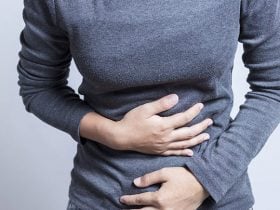Gastritis

Gastritis is a medical condition where the stomach lining becomes swollen and painful.
Acute gastritis happens in the short term and comes on quickly, mostly because of a bacterial infection such as helicobacter pylori bacteria.
Doctors have identified some conditions that cause chronic gastritis, they include:
- Autoimmune sicknesses
- Allergies
- Viruses in patients with the compromised immune system
- Sarcoidosis [5]
- Crohn’s disease [6]
Antibiotics are used to treat bacterial infections. It is vital to identify the underlying cause if the gastritis is severe. Decreasing the amount of acid in the stomach by eating food with low acid content or using medications can also help.
Gas happens naturally in the intestines and digestive tract. Accumulation of gas can lead to feelings of bloating, pressure and fullness.
Gas pain increases in the presence of an infection, virus, constipation, or diarrhea. It is not so easy to know if upper stomach pain is caused by the accumulation of gas. However, experts have come up with some signs to know if gas is the cause, these signs are;
- Burping or release of gas
- Presence of constipation or diarrhea
- Pain experienced in waves
- Movement of something in the stomach
- Swelling of the stomach
The pain that accompanies gas is not always serious and over-the-counter drugs can be useful. Doctors advise people to consider eating slowly to prevent swallowing air and avoid exacerbation of the gas. In some people, certain foods such as broccoli can cause gas pain or increase it.













